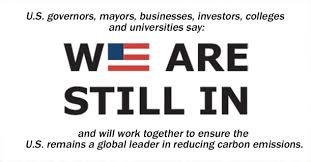Regulation
Get Ready for Phase 2 of the Deregulation Wars
Air quality standards are next on the chopping block.
The first phase of Trump’s regulatory rollbacks has been directed against Obama’s climate change regulations. Those deregulatory actions will be finalized soon. What happens next will be in the hands of the courts. But the Trump EPA is now beginning a new phase in its attack on environmental regulation. Having tried to eliminate climate rregulation, …
Continue reading “Get Ready for Phase 2 of the Deregulation Wars”
CONTINUE READINGPerfection – Public Enemy Number One, or Straw Man?
We don’t let the perfect be the enemy of the good. Is that always a good thing?
“Don’t let the perfect be the enemy of the good.” How many times do you think you have heard that phrase? Many people attribute the concept to Voltaire, so as advice goes, how bad could it be? It’s darn good advice in many situations – such as selecting a checkout line to stand in at …
Continue reading “Perfection – Public Enemy Number One, or Straw Man?”
CONTINUE READINGThe Expanding Gap Between Business and Trump
Big business was happily married to the GOP. But there’s trouble in paradise.
The GOP used to be synonymous with big business. But there seem to be growing divisions – divisions that may open the way to new environmental initiatives. In April, the Washington Post ran a story about the U.S. Chamber of Commerce’s decision to loosen its ties to the GOP and move toward a more bipartisan …
Continue reading “The Expanding Gap Between Business and Trump”
CONTINUE READINGThe Flight of the Bumblebee
The Trump Administration loses an environmental case. Again.
Last Friday, the Fourth Circuit halted efforts to build a natural gas pipeline because the Administration had done such a lousy job of showing its compliance with the Endangered Species Act. This was one of the Administration’s many losses in court. The case involved a perfect example of “arbitrary and capricious” decision making, to use …
Continue reading “The Flight of the Bumblebee”
CONTINUE READINGEndangered Deference
The Supreme Court’s recent, misguided, Weyerhaeuser decision displays the Court majority’s hostility to agency expertise
Cross-posted from The Regulatory Review In Weyerhaeuser v. US Fish and Wildlife Service, a unanimous Supreme Court, with Justice Gorsuch not participating, indicated that it is not inclined to defer to agency expertise. Judicial power dominates this Court’s approach to administrative law, not just in the context of Chevron deference, and not just within the …
Continue reading “Endangered Deference”
CONTINUE READINGHow I Learned to Stop Worrying and Love OIRA
OIRA may have had its problems. What we have right now is much worse.
If you’re like most environmentalists, you probably don’t have a high opinion of OIRA, the White House office that’s supposed to oversee regulations. (For those who are new to this, OIRA stands for the Office of Information and Regulatory Affairs.) The complaints are legion: that OIRA lacks transparency, that it acts as a back door …
Continue reading “How I Learned to Stop Worrying and Love OIRA”
CONTINUE READINGThe Trump Administration’s Latest Efforts to Hobble the Clean Water Act
Administration’s New Plan to Eviscerate States’ CWA § 401 Certification Authority Is Flawed Procedurally & Substantively
By now, readers of Legal Planet are well aware of President Trump’s ongoing efforts to rescind the Obama Administration’s “Waters of the United States” rule and replace it with a new federal regulation that dramatically circumscribes federal regulatory authority under the Clean Water Act. My Legal Planet colleagues and I have previously blogged on this …
Continue reading “The Trump Administration’s Latest Efforts to Hobble the Clean Water Act”
CONTINUE READINGWhere’s the Beef?
Mississippi’s “Veggie Burgers” Ban is Almost Certainly Unconstitutional
Mississippi recently passed a law that has the effect of banning terms like “veggie burger.” It’s easy to imagine other states passing similar laws. From an environmental view, that’s problematic, because beef in particular is connected with much higher greenhouse gas emissions than plant products. It’s not just the methane from cow-burps, it’s also all …
Continue reading “Where’s the Beef?”
CONTINUE READINGDoes the US have a delegation problem?
A comparison of US and Canadian environmental law indicates perhaps not
One of the big cases at the end of this year’s Supreme Court term was Gundy v. United States, where four justices signaled they were open to reviving a long dormant doctrine, the non-delegation doctrine, to constrain open-ended delegations of authority from Congress to Executive Branch agencies. There’s been various prognostications as to whether the …
Continue reading “Does the US have a delegation problem?”
CONTINUE READINGThe Witching Auer
The Supreme Court rules on deference to agency interpretations.
The Court’s opinion in Kisor v. Wilkie was eagerly awaited by administrative law experts. It is one skirmish in the ongoing war over deference to agencies. In this case, the issue was whether to overrule the Auer doctrine, which requires courts to defer to an agency’s reasonable interpretation of its own regulations. This doctrine, like …
Continue reading “The Witching Auer”
CONTINUE READING










